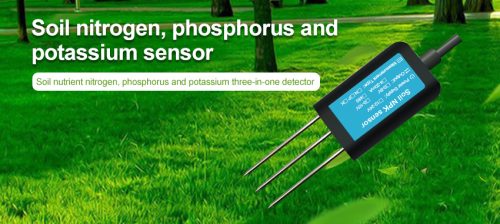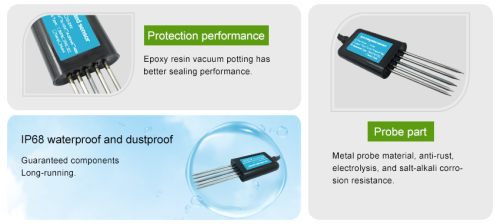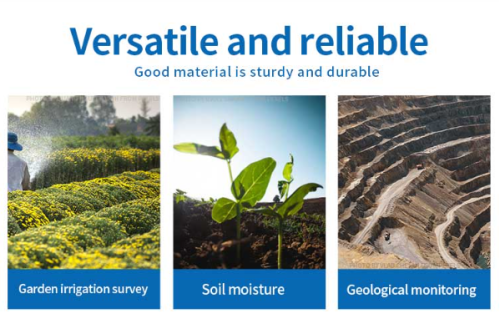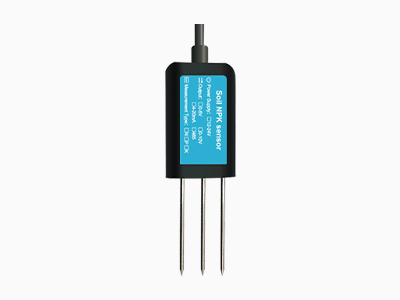Understand NPK Sensor

NPK sensor, also known as nutrient sensors, have become a key technology in modern agriculture. Soil nutrient sensors provide farmers with real-time data on nutrient levels in the soil. NPK refers to the three primary nutrients required for plant growth: nitrogen (N), phosphorus (P), and potassium (K). Monitoring and managing these nutrients are crucial for optimizing crop yields, reducing fertilizer usage, and minimizing environmental impact. In this comprehensive guide, we will explore the importance of NPK sensors in agriculture, their advancements, and the benefits they offer to farmers and the environment.
The Importance of NPK Sensors
Traditional methods of assessing soil nutrient levels, such as laboratory testing and visual inspection, are time-consuming, labor-intensive, and often provide only a snapshot of the soil’s condition. NPK sensor, on the other hand, enable real-time, in-situ measurement of nutrient levels, allowing farmers to make data-driven decisions on fertilizer application, irrigation, and crop management. By providing accurate and timely information, NPK sensors help farmers optimize nutrient utilization, minimize waste, and improve overall crop health and productivity.
Advancements in NPK Sensor Technology

In recent years, significant advancements have been made in NPK sensor technology, enhancing their accuracy, reliability, and ease of use. Modern NPK sensors utilize a range of measurement techniques, including optical, electrochemical, and spectroscopic methods, to detect and quantify nutrient levels in the soil. These sensors are designed to be rugged, weatherproof, and capable of withstanding harsh agricultural environments, ensuring long-term performance and durability.
Furthermore, many NPK sensor now offer wireless connectivity and integration with precision agriculture platforms, enabling seamless data collection, analysis, and visualization. This connectivity allows farmers to access real-time nutrient data from multiple locations within their fields, facilitating targeted and site-specific nutrient management strategies. Additionally, some NPK sensors are equipped with advanced algorithms and machine learning capabilities, enabling them to provide actionable insights and recommendations for optimizing fertilizer application and crop nutrition.
Benefits of NPK Sensors for Farmers
The adoption of NPK sensors offers numerous benefits to farmers, including improved resource efficiency, enhanced crop quality, and increased profitability. By precisely monitoring soil nutrient levels, farmers can tailor their fertilizer applications to meet the specific needs of their crops, reducing the risk of over-fertilization and nutrient runoff. This targeted approach not only conserves resources but also minimizes environmental impact, contributing to sustainable agricultural practices.

Moreover, NPK sensors enable farmers to identify nutrient deficiencies and imbalances early in the growing season, allowing for timely corrective measures to be implemented. This proactive approach can prevent yield losses and ensure optimal crop development, ultimately leading to higher yields and improved crop quality. Additionally, by reducing the reliance on guesswork and intuition, NPK sensors empower farmers to make informed decisions based on accurate and reliable data, leading to more efficient and profitable farming operations.
Environmental Benefits of NPK Sensors
In addition to their direct benefits for farmers, NPK sensors also play a crucial role in promoting environmental sustainability in agriculture. By optimizing nutrient management, these sensors help minimize the risk of nutrient leaching, runoff, and soil erosion, which can contribute to water pollution and ecosystem degradation. Furthermore, by reducing the overall use of fertilizers, NPK sensors support efforts to mitigate greenhouse gas emissions and minimize the environmental footprint of agricultural activities.

The ability of NPK sensors to facilitate precise and targeted nutrient application aligns with the principles of precision agriculture, which aims to optimize resource use and minimize environmental impact. By promoting more sustainable and responsible farming practices, NPK sensors contribute to the long-term health and resilience of agricultural ecosystems, benefitting both farmers and the environment.
In conclusion, NPK sensors have become indispensable tools for modern agriculture, offering farmers the ability to monitor and manage soil nutrient levels with unprecedented precision and efficiency. The advancements in NPK sensor technology have transformed nutrient management practices, enabling farmers to optimize crop yields, reduce environmental impact, and enhance overall sustainability. NPK sensors are poised to play a central role in driving the future of smart, sustainable.
